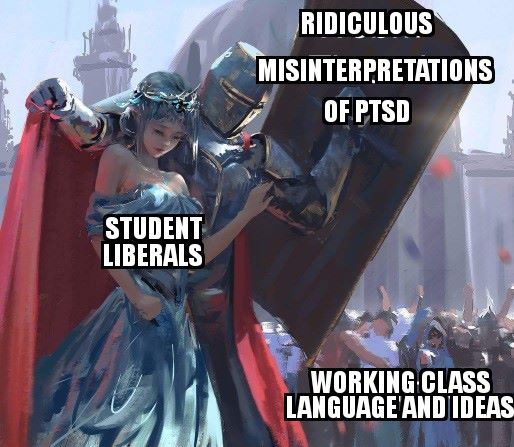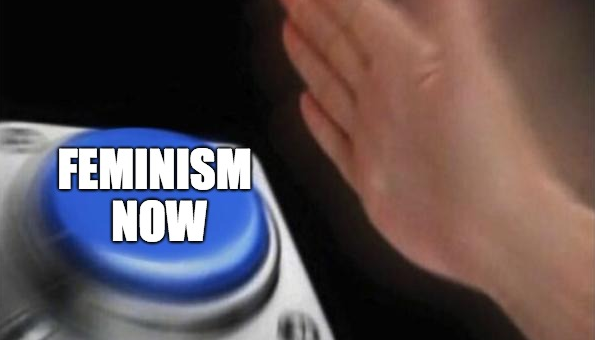Why Feminists Need to Seize the Memes of Production
by Iida Käyhkö and Camille Barbagallo
7 April 2018

Culture matters. Mainstream culture reflects and shapes the dominant ideas and behaviours of our society. For many people, perhaps even the majority of us – women, people with disabilities, people of colour, queer people, the poor – mainstream cultural representations are often derogatory and offensive, or we are simply missing from the picture. White, middle-class, heterosexual men dominate our society and consequently our culture. Masculinity is consistently centre stage – the benchmark against which we are all measured.
The splintering of mainstream culture into online enclaves has supposedly created spaces in which these norms can be questioned and cultural hierarchies challenged. How disappointing, then, that the online arsenal of the British left is currently dominated by what we’re calling ‘progressive laddism’, a subculture that repositions masculinity, and a very limited image of masculinity at that, at its very centre.
Progressive laddism attempts to rehabilitate and redeem lad culture through widening the definition of the ‘lad’ to include women and queer people. Despite having supposedly engaged with feminist and queer concerns about how gender and sexuality are represented, progressive laddism still centres masculinity, mixing caricatures of working class masculinity, such as pub culture, beer and football with LadBible banter through the medium of memes. This has become the dominant online output of the left, promoting a simplistic idea of masculinity and excluding and marginalising everyone else.
Memes are a simplistic form of communication, and one that has for some time been monopolised by the far right. Uncritically repurposing these memes fails to challenge – or even acknowledge – the sexism and homophobia of almost all online spaces. In many so-called progressive memes women are presented as marginal figures or objects of ridicule, while non-masculine or queer men are vilified.
June 8 Shitposting Social Club, arguably the behemoth of leftist meme pages, with almost 50,000 followers, consistently frames banter and a performance of male heterosexuality as measuring sticks for acceptable masculinity. They’ve pioneered the style proliferated by a growing number of meme pages, such as UCU Strikeposting – a page that despite its niche follower base of students in support of the university strikes has gained over 4,000 followers in the last two months and exemplify the proliferation of this meme culture among the student left. Some recent examples from the page include ridiculing a man in a pink blazer and a screen-grab from a porn site in which a naked woman saying “it’s so big” is framed as a reference to “student-worker solidarity”. While, a screen-shot of a text reading “It’s time for lecturers to strike your ass with that long hard dick of industrial action” manages to be simultaneously sexist and homophobic.

Time and time again these memes make use of language that’s exclusionary – Corbyn becomes the “absolute boy”, everyone else is a “socialist boi” or “strikey boi”. Whether or not “boi” is a term borrowed from queer culture is largely irrelevant in this context; it invites everyone to identify as a “boi”. And this is exactly the problem.

Repeating a familiar patriarchal trope, both the subject and the viewer of the meme are presumed to be men. Identification, on at least some level, with a specific vision of masculinity is required in order to feel a part of what’s becoming a dominant culture of the left. Failure to do so signifies not only a lack of a sense of humour (‘it’s just a joke/it’s a meme format/you just don’t get it’) and being a prude, but on a deeper level any disagreement with the progressive lad project is dismissed as identity politics or a feminist distraction that undermines the movement. Whether women, queer people or non-masculine men enjoy, appreciate or even create these memes is not the point. The point is that in this meme culture, the role for women is to laugh at jokes that are almost always made at their expense and to keep laughing while we are positioned at the margins of politics.

The jury is still out about whether we want or need to rehabilitate laddism. But – and it is a big but – if that is to be the project then there needs to be some baseline agreement on what the politics of such a project would entail: challenging misogyny, de-centering the masculine subject and widening gender roles for men.
We desperately need representations of masculinity that move beyond the narrow vision of pubs, football and beer to include the richness and complexity of working class men’s lives. For decades, working class masculinity has been reviled in the UK and austerity and the collapse of industry has ravaged many of the spaces and expressions of working class culture even further.
It’s worth noting, however, that working class masculinity has still been valorised in a way that working class femininity never has. There’s no mass political project seeking to centre the specific struggles of working class womanhood. Instead, the expectation seems to be that working class masculinity will serve as a catch-all. And then, we’re back where we started – after all, women on the left have always been forced to aspire to be more like the boys, to bolster their egos by laughing at their jokes and to accept and work around the misogyny that comes with the glorification of masculine behaviours. This perpetuates the damaging tradition of women having to act like ‘one of the boys‘ in order to find a space within political movements.
It’s true that the left needs to be able to speak in different registers and to as wide a scope of society as possible and that meme pages are reaching people who aren’t enticed by endless pontificating on Marxist theory. However, the promotion of a glorified image of the lad cannot be the extent of our popular output or political imagination. A movement that’s built on unchallenged gender hierarchies, imagery borrowed from the far right, and an unwillingness to engage with critique, is not the kind of movement we want to or can be a part of.

We refuse to sit back and allow sexist and misogynistic content to be passed off as progressive or radical. Our social movements cannot be based on a refrain of ‘everyone can be a lad’. Instead, it’s time for us to widen our repertoire and create content that subverts the dominant hierarchies of gender and sexuality. Our memes must be a weapon in our efforts to build a feminist future. Seizing the feminist memes of production is where we begin.